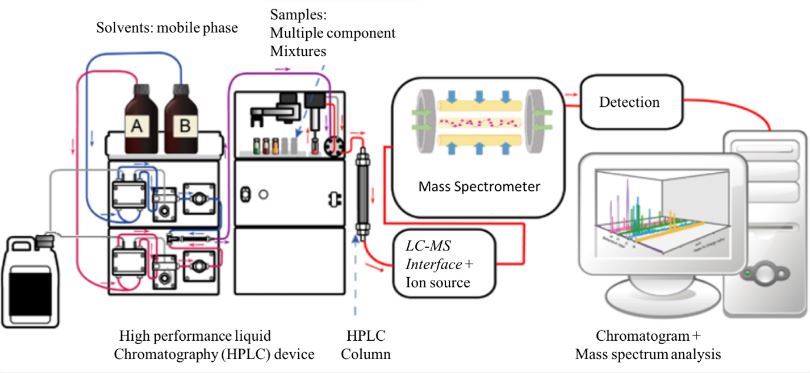The major difference between HPLC and LCMS is that HPLC uses Non-volatile and Volatile buffers whereas LCMS uses Only volatile buffers.
Common Difference between HPLC and LCMS/HPLC-MS

HPLC full form is High-Performance Liquid Chromatography. It is a technique that is used to separate and analyze compounds in a mixture using liquid chromatography. It is a highly efficient and precise method used in pharmaceuticals. HPLC separates compounds based on their physical and chemical properties and can detect even trace amounts of a substance.
LC–MS Fumm form is Liquid Chromatography-Mass Spectrometry. It is a technique that combines the separation capabilities of liquid chromatography (LC) with the identification and quantification capabilities of mass spectrometry (MS). Mass spectrometry is used to find out mass to mass-to-charge ratio of charged particles. It is used for the different types of compounds, including small molecules, proteins, and peptides, in complex mixtures. It is highly sensitive and can detect trace levels of substances in a sample.
HPLC-MS: The combination of HPLC-MS is commonly known as LC-MS, Combining both techniques lowers error and increases accuracy, Liquid chromatography-mass spectrometry is highly required in the case of a variety of compounds.
Difference between HPLC and LCMS
| HPLC | LCMS |
|---|---|
| Full Name: High-Performance Liquid chromatography (or) High-Pressure Liquid chromatography. | Full Name: Liquid Chromatography Coupled with Mass Spectrometry. |
| Buffers: Non-volatile and Volatile buffers will be used Examples: Phosphate buffers, Citrate buffers, Trifluoroacetic acid, Ammonium Acetate, Ammonium formate (NH4HCO2), Formic acid, Acetic acid, and Bicarbonate buffers. | Buffers, Only volatile buffers will be used Examples: Ammonium acetate, Ammonium formate (NH4HCO2), Formic acid, Acetic acid, and Ammonium bicarbonate buffers -Phosphate buffers (Non-volatile buffers) will not be used. |
| It helps in the separation and identification of a mixture of compounds through a PDA or UV detector. | LC helps in the separation of a mixture of compounds whereas Mass Spectrometry helps in the identification of compounds. |
| Low sensitivity and specificity and will not give any molecular structure information. | It can provide high sensitivity, specificity, and molecular structural information for the qualitative assay of drugs and their metabolites. |
| Sample Processing: Mostly Clean or Aqueous sample -No sample extraction required. | Sample Processing: Mostlybiological sample -Sample extraction is required to extract the compound to the solution which can be injected into the LCMS. |
| Detection: The detection of a compound is based on the wavelength. | Detection: The detection of a compound is based on m/z (mass/charge ratio). |
| Detector: PDA or UV detector. | Detector: CEM ( Channel Electro Multiplier). |
| Uses: It is used for identifying, quantifying, and purifying the individual components of the mixture. | Uses: It is used for the separation, identification, and quantification of both unknown and known compounds as well as to elucidate the structure and chemical properties of different molecules. |
| Analysis: It is used to analyze finished drug products and their ingredients quantitatively and qualitatively. | Analysis: It is used to analyze biochemical, organic, and inorganic compounds quantitatively and qualitatively. |
Advantage of LCMS over HPLC
If talk about LC-MS, It is a more sensitive, accurate, and fast analyzing method than HPLC, but it requires trained workers because it is not easy to operate. The choice of which method to use will depend on the specific needs of the compound analysis and the resources available.
Frequently Asked Questions (FAQs)
Ans: LC-MS technique is often considered to be a more accurate, sensitive, and specific method than HPLC because it combines the separation capabilities of LC with the identification and quantification capabilities of MS. In summary, LC-MS instruments are more effective than HPLC.

Panks Pamyal is a Author and Editor at Pharmaguddu.com. He Worked in Top Pharmaceuticals MNCs in India had a more then 10 years experience in Quality control department. He Delivering most valuable insights and knowledge through this website.
